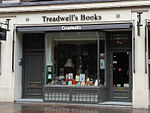London School of Hygiene and Tropical Medicine
The London School of Hygiene and Tropical Medicine (LSHTM) is a public research university in Bloomsbury, central London, and a member institution of the University of London that specialises in public health and tropical medicine. The institution was founded in 1899 by Sir Patrick Manson, after a donation from the Indian Parsi philanthropist B. D. Petit. Since its foundation it has become one of the most highly placed institutions in global rankings in the fields of public health and infectious diseases.The annual income of the institution for 2020–21 was £244.2 million, of which £167.6 million was from research grants and contracts, with expenditures totalling £235.2 million during the same period.
Excerpt from the Wikipedia article London School of Hygiene and Tropical Medicine (License: CC BY-SA 3.0, Authors).London School of Hygiene and Tropical Medicine
Gower Street, London Bloomsbury (London Borough of Camden)
Geographical coordinates (GPS) Address Website External links Nearby Places Show on map
Geographical coordinates (GPS)
| Latitude | Longitude |
|---|---|
| N 51.5209 ° | E -0.1307 ° |
Address
London School of Hygiene and Tropical Medicine
Gower Street
WC1E 7HT London, Bloomsbury (London Borough of Camden)
England, United Kingdom
Open on Google Maps









